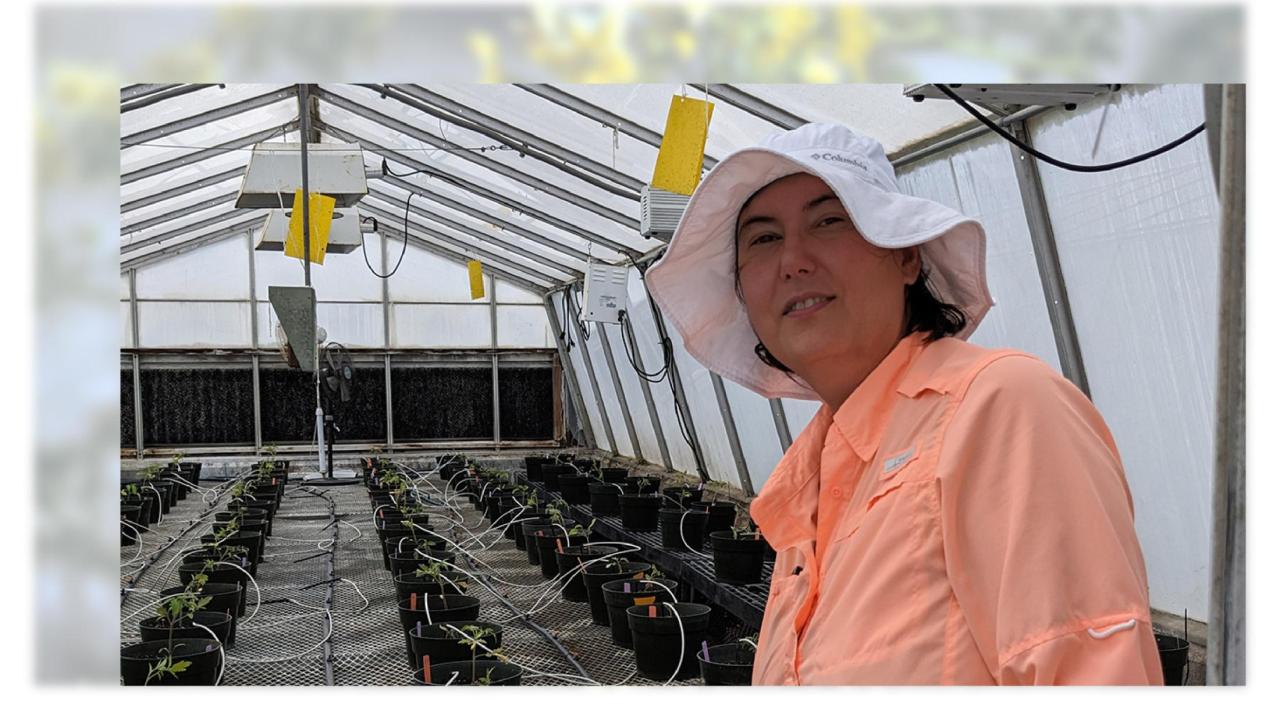
DEI scholar: Anca Barcu
Grew up drawing water from a well, she now seeks to help dryland farmers
The Communists seized the family farm 70 miles outside Bucharest, Romania, and left Anca Barcu’s grandmother with her house and a half-acre of land. Then, they trucked off the family’s two white oxen – their tractor and transport. Barcu’s parents worked in the capital, but couldn’t afford to keep her with them, so from the age of 10 months, she grew up with her widowed grandmother in the country. At 3, the little girl pestered to have her own tiny flower garden until, finally, the family gave in.
Barcu and Grandmother Ileana used a bucket to pull up water from a well for the chickens and, later, the cow. Not much was left for the garden, but using hand tools and hard work, they grew tomatoes, potatoes, onions, beans, corn and herbs, and foraged more food in the nearby forest.

Now Barcu's a doctoral student in the Department of Plant Sciences. In 2022, she became the first recipient of the Graduate Student Research assistantship focusing on diversity, equity and inclusion. Sponsored by departmental funds and initiated by Chair Gail Taylor, the grant provides $20,000 yearly for several years to a graduate student whose trajectory promises to bring underrepresented people into plant sciences.
“This new DEI scholarship is an exciting development for the department," Taylor said. "The award acknowledges the importance of enabling individuals from diverse backgrounds to be the change-makers for the future of plant sciences and resilient agriculture. Diverse perspectives and thinking enable us all to benefit from different viewpoints and better decision-making. I am delighted to be initiating this scheme in the department."
Barcu brings understanding of dryland subsistence farming in a developing nation. In the United States, dryland farmers face similar struggles, typically making do with a single crop. Barcu wants to help them expand their possibilities – and their income – with tomatoes that can flourish with little water.
“I can empathize with, not only very poor people, but people in very difficult situations,” Barcu said. “If I can find really good candidate tomatoes for dry farming, these varieties could be used in developing countries where people don’t have access to irrigation. They could still have good-quality produce.” The goal echoes the flavors of her childhood: Grandma Ileana boiled their tomatoes in an iron cauldron to create dinner from the sauce, with herbs and a little oil, served over polenta made from their corn.
Working in the lab of Jennifer Funk, Barcu is screening 30 varieties of tomato. She plans to take the 10 best candidates and test them next year with partners in California’s Central Coast, Humboldt County and Oregon.
Lifetime of leadership
Barcu was older than most students when she began her undergraduate work. She established an association for horticulture students at her university in Bucharest, studied in an exchange program in Italy, then arrived at UC Davis for a master’s program. Here, she helped organize the Farming Around the World Symposium for universities with student farms; and she helped Nicaraguan villagers establish a community garden that sparked family plots throughout the village. She continues to volunteer her time as a mentor and in leadership roles in numerous student organizations.

In previous years, Barcu made ends meet as a teaching assistant, but this grant lets her devote that time to research.
“It’s fantastic, because for two quarters each year, I can focus on my work,” Barcu said. “Without the GSR grant, it would take a lot longer to finish my degree.”
In addition, as the mother of a year-old son nicknamed Bubu, she’ll have a little more time to spend with her family.
“You don’t have to be the perfect parent,” Barcu observed. “My parents really struggled in lots of ways, but the quality time they spent was really important to me, so that’s what I’m trying to do for my child.”
And, like millions of others, Barcu struggles with grief: In 2020, her sister Cristina died of COVID-19. Completing her doctoral work offers Barcu some comfort.
“It has been a very painful process going forward, as she was my only sibling and we were very close,” Barcu said. “I know she would be proud of what I have accomplished.”
Barcu had not considered motherhood until suffering that loss. She recalled the astonishing sense of deep, connecting, incomprehensible love that washed over her the first moment she held her son – a feeling that infuses her work now.
“I had a purpose before, but now it feels even stronger,” Barcu reflected. “Of course, I want to make a positive change in the world, but he is part of this world, and I’m trying to make it better for him.”
About this series
This is among a series of stories profiling people who have received a Graduate Student Research assistantship from the Department of Plant Sciences. Within the GSR assistance program, the department has created a Diversity, Equity and Inclusion award. This award provides funding specifically for students who show the potential for, or have actual achievements, contributing to the department’s commitment to raise up perspectives and experiences that are under-represented in the plant sciences.
Related links
- More about Ph.D. student Anca Barcu.
- More about Graduate Student Research assistance, including awards supporting underrepresented students, in the UC Davis Department of Plant Sciences.
- More about the department’s efforts to bring underrepresented groups into plant sciences and into the department and create an atmosphere of diversity, equity and inclusion.
- More about GSR award recipients who have gone on to impact California and beyond.
Media Resources
- Trina Kleist, UC Davis Department of Plant Sciences, tkleist@ucdavis.edu, (530) 754-6846 or (530) 601-6846
